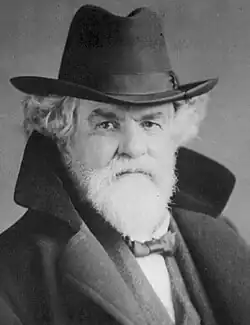Edward Eggleston

Edward Eggleston (December 10, 1837 – September 3, 1902) was an American historian and novelist.
Quotes
The End of the World (1872)
- The End of the World: A Love Story (New York: Orange Judd & Co., 1872)
- Shrews are tamed only by silence.
- Ch. 1
- The people liked the prospect of the end of the world because it would be a spectacle, something to relieve the fearful monotony of their lives. Funerals and weddings were commonplace, and nothing could have been so interesting to them as the coming of the end of the world, ... unless it had been a first-class circus.
- Ch. 8
The Circuit-Rider (1874)
- The Circuit-Rider: A Tale of the Heroic Age (New York: J. B. Ford & Co., 1874)
- Persistent people begin their success where others end in failure.
- Ch. 14
The Faith Doctor (1891)
- The Faith Doctor: A Story of New York (New York: D. Appleton & Co., 1891)
- I studied mind-cure, or metaphysical healing, which strikes at the root of disease; I went into hypnotism, mesmerism, and phrenomagnetism, and the od force—I don't suppose you know about the od which Reichenbach discovered.
- Ch. 26 (Miss Bowyer loq.)
Attributed

- Journalism is organized gossip.
- Reported in Frank E. Spaulding; William D. Miller (eds.) The Graded School Speller, Part Two (Ginn & Co., 1914), p. 157
A Homiletic Encyclopaedia (1879)
- Reported in R. A. Bertram (ed.) A Homiletic Encyclopaedia of Illustrations in Theology and Morals, A Handbook of Practical Divinity, and A Commentary on Holy Scripture (R. D. Dickinson, 1879)
- Jesus was the first great teacher of men who showed a genuine sympathy for childhood,—perhaps the only teacher of antiquity who cared for childhood as such. Plato treats of children and their games, but he treats them from the stand-point of a publicist. They are elements not to be left out in constructing society. Children, in Plato's eyes, are not to be neglected, because children will inevitably come to be men and women. But Jesus was the first who loved childhood for the sake of childhood. In the earlier stages of civilisation it is the main endeavour of men to get away from childhood. It represents immaturity of body and mind, ignorance and folly. The ancients esteemed it their first duty to put away childish things. It was Jesus who, seeking to bring about a new and higher development of character, perceived that there were elements in childhood to be preserved in the highest manhood; that a man must, indeed, set back again toward the innocence and simplicity of childhood if he would be truly a man. Until Jesus Christ, the world had no place for childhood in its thoughts. When He said, "Of such is the kingdom of Heaven," it was a revelation.
- No. 765, p. 132
- Unattributed in The Christian Union, vol. 8, no. 13 (September 24, 1873), p. 251
- Christ's example is opposed, not to temperance, but to asceticism. Even the example of Jesus Christ must be followed in the light of common sense. What He might do in one age or nation we may find perilous in a different state of society. It is our bounden duty to abstain from that which causeth our brother to offend, whether it be meat or wine. But let us always distrust those who twist the plain language of Scripture in an endeavour to prove that what Christ drank was not wine.
- No. 902, pp. 155–6
- People who are always lamenting their lack of feeling are, for the most part, those who crave some vague sense of the turpitude of human wrong-doing in general. But John was the most personal of preachers. He pointed out the specific sins of his hearers. He listened to specific confessions. He gave specific exhortations. Repentance of a general sort is not worth the while. If you will regret your sins, drag out your own particular wrong-doing and look at it. Do not weep over Adam's fall, nor repent of the general depravity of man, but turn with loathing and regret from that which defiles your own life. If you are stingy, or greedy, or envious, or lustful, or smally selfish, or ill-tempered, or censorious, or lazy, remember that one tear over your specific sin is better than a thousand shed from a vague sense of general unworthiness.
- No. 4266, p. 719
External links
- Josiah H. Gilbert (ed.) Burning Words of Brilliant Writers: A Cyclopaedia of Quotations from the Religious Literature of All Ages (Troy, NY: H. B. Nims & Co., 1883), p. 49